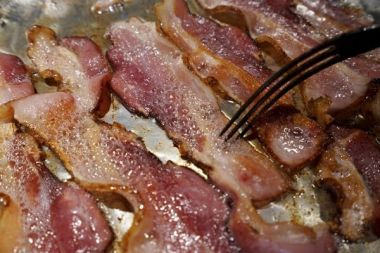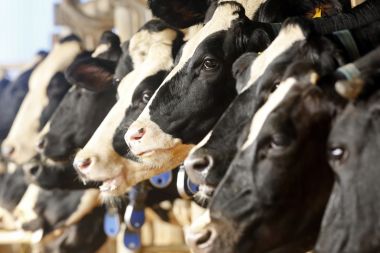Should Christians give up meat to save the world?

There are certain admissions that are always guaranteed to get a reaction when you're forced to make them in company...
You don't like Taylor Swift?? Astonishing... You prefer the Stones to The Beatles?? Have you even got ears?... You don't really like Star Wars?? Are you feeling OK?
For the record I think Taylor is alright, prefer the Beatles and can take or leave Star Wars. My own personal dynamite admission though, is coming out as vegetarian. Even though in the US, UK and elsewhere in the West it's now a well-established phenomenon, still according to the Vegetarian Society, only two per cent of us are actually committed non-meat munchers.
This means that there are plenty of people who don't know many, or even any veggies. So when it comes up in conversation that I haven't eaten meat for 27 years there are a few standard responses.
1) Don't you miss bacon?
2) What do you eat instead?
3) Oh, I couldn't possibly do that...
4) I tried being veggie for two weeks when I was 12 but didn't last.
5) Can I have your burger then?
The conversations are as predictable as British people mentioning the weather. But I'm less bothered by this than I used to be - I've realised it's because most people I come across seem not to have really considered whether they should eat meat. They just do it. My presence in the conversation forces them to think about the issue and more often than not we end up having an interesting chat about the ethics of meat eating.
This week is Vegetarian Week so it seems as good a time as any to ask, should we as Christians be vegetarians?
Firstly, we turn to Genesis. In Chapter Nine God says, "Just as I gave you the green plants, I now give you everything." This implies that up until that point a vegetarian diet had been the norm. In other words, the world as it was meant to be, in its good created state had vegetarianism as the default for humankind – and also for the animal kingdom.
We then turn to Isaiah 65 and look at a vision for the perfected Kingdom of God to come. Again, we see an image of carnivorous animals being at peace. It says, "The wolf and the lamb will feed together, and the lion will eat straw like the ox, but dust will be the serpent's food. They will neither hunt nor destroy on all my holy mountain."
So it seems that there is a convincing case to be made that eating meat isn't part of the perfect order.
However, it's not as cut and dried as that. If we turn to look at the life of Jesus, we see that not only did he celebrate the Passover meal (containing lamb) with His disciples. Even when He appears to them in His resurrected body in Luke 24, "They gave him a piece of broiled fish, and he took it and ate it in their presence."
So Jesus clearly wasn't vegetarian. This means that rather than being a matter of doctrine as such, whether we should eat meat is an ethical question which Christians should approach as people wanting to be good news to the world, to creation and to our fellow humans.
Animal Treatment
In considering the ethical approach there are three factors. First, the suffering to animals. You don't have to believe animals have 'rights' or 'souls' to know that they can experience pain and that part of our duty to care for creation is to avoid unnecessary suffering for animals. So, while the Bible gives us the permission and the precedent to eat meat, it doesn't give us carte blanche to treat animals badly.
When we see the horrors of the meat production industry laid bare, surely we can't, in good conscience, think that God would approve of his creations being kept in almost constant agony, simply so we can get cheap food? Examples of battery hens being kept in obscene conditions are sometimes presented as the exception rather than the rule. But sadly, local farms which treat their animals well are the exception. Giant agribusinesses represent ten per cent of all consumer spending.
Climate change

Greenhouse gases are causing the earth to warm dangerously. But while transport and industry represent a large chunk of this, food production is now responsible for 30 per cent of emmissions. Meat is the main culprit here. Beef, "requires 28 times more land to produce than pork or chicken, 11 times more water and results in five times more climate-warming emissions. When compared to staples like potatoes, wheat, and rice, the impact of beef per calorie is even more extreme, requiring 160 times more land and producing 11 times more greenhouse gases." There are other adverse factors too – such as increased water consumption and increased pollution from waste.
Christian Aid says a billion people are going to face global flooding by 2060 if we don't stop climate change. Our meat consumption is one of the causes. How can we possibly justify this?
Lack of food
World population is growing. The amount of meat being eaten in the developing world is increasing. Not only is this likely to exacerbate animal suffering and climate disasters, but it is also going to leave food even more scarce. If current trends continue, "the double whammy of population growth and richer diets will require us to roughly double the amount of crops we grow by 2050."
There are still 850 million people going to bed hungry around the world every night. This is a scandal we should be addressing – rather than using increasing amounts of farmland to produce meat. It is so much more efficient to use that land to grow staple crops to feed the hungry than to produce meat to feed rich westerners and a growing middle class around the world.
So, while the Christian faith has no prohibition on meat and eating it isn't wrong in itself, it's really time to chew on the implications of our meat addiction for our world, the creation and the future of the whole planet.











